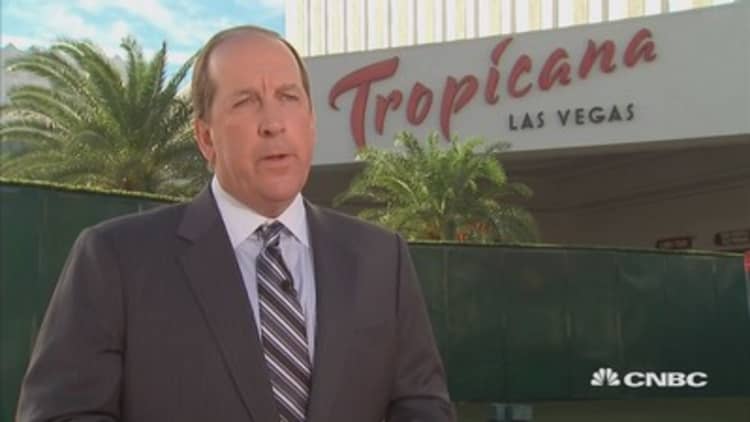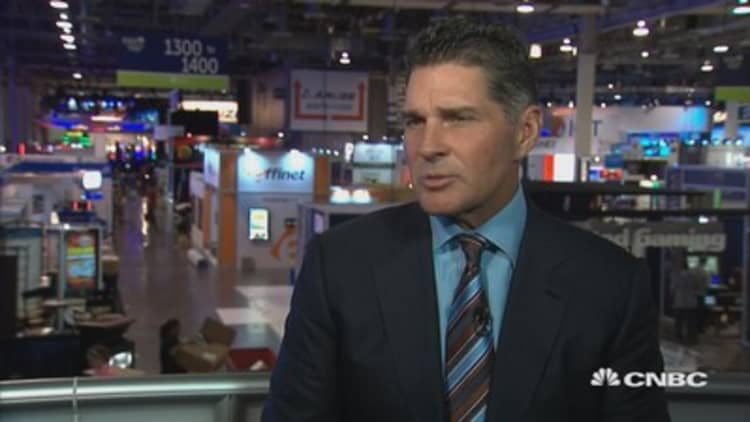
The recession has made for strange bedfellows. Private equity guys running a casino? People who run racetracks and casinos in the Midwest taking over legendary properties on the Las Vegas Strip?
This is the post-recession Las Vegas, where the market for distressed properties has spread from the housing market to the very heart of Sin City.
For example, last year the private equity firm Blackstone Group bought the Cosmopolitan on the Strip for essentially half off. Deutsche Bank had poured $4 billion into the property after foreclosing on the original developer, and Blackstone took it off the bank's hands for $1.73 billion.
"We posted our first net income ever in the history of the operation in the second quarter," said Cosmopolitan CEO Bill McBeath, a Vegas veteran who started under the tutelage of Steve Wynn of Wynn Resorts. "So, yeah, I mean — that's the goal, to make money."
Down Las Vegas Boulevard, Penn National Gaming is the new kid on the block, getting in at the lowest price. Last month it took possession of the Tropicana after buying it out of bankruptcy for a mere $360 million.
"The asset is in very good shape," said Penn National CEO Tim Wilmott, who believes the land alone — 35 acres — is worth close to $250 million. Penn plans to spend millions more to upgrade nongambling areas such as restaurants and retail. "On top of that, we are doing some technology work to connect up our customer loyalty program that has about three million active customers from around the United States."
That loyalty program is why Penn, which has been doing just fine lately without a presence on the Strip, needs a place for customers to stay and pay. "From my previous work with Harrah's total rewards program, I know the power of feeding Las Vegas with regional customers who are coming anyway."

Penn looked at a handful properties, including some owned by Caesars. Wilmott also considered the vacant, unfinished Fontainebleau, owned by Carl Icahn. "It probably required another $1.5 billion to finish, and the location wasn't as good as the Tropicana Las Vegas, so we passed on that."
While many Las Vegas operators like Penn National Gaming are boosting investment in nongaming amenities, Blackstone Group is doing the opposite at the Cosmopolitan. Bill McBeath is putting money into the casino itself and has "experienced pretty significant gains." The Cosmopolitan is still promoting itself with an edgy campaign — "Just the right amount of wrong" — but getting people to gamble is once again front and center.
"We took the approach that we could preserve all that was great about the Cosmopolitan experience from an experiential hospitality side and layer in the true gamer who would appreciate both elements of it," said McBeath. "That wasn't really a focus or a core discipline of the previous ownership."
Both Blackstone and Penn benefit from not being exposed to Asia, even though an ongoing corruption crackdown in China has even hurt Las Vegas. Baccarat revenues have plummeted. "The high-end, international Southeast Asian gamer contributes greatly (to Las Vegas), so that's a little worrisome," said McBeath, "but it's a small percentage of our overall revenues."
Wilmott said he's happy Penn didn't jump into Asia when everyone else was: "Eighteen months ago, not being in Asia was a real weakness for all U.S. gaming companies that didn't have a presence there."
Penn was suffering, and the company explored investing in Vietnam, Cambodia and Japan. "Everyone was hot last year, thinking Japan was going to do something," he said. "The temperature this year is not as optimistic. I don't think you're going to see any new gaming markets open up in Asia over the next couple of years."
Meanwhile in the United States, "We've seen improvement with our customers," with better wages, lower gas prices and lower unemployment. "Who knows where it will be 12 months from now?" Wilmott said. "It's certainly improved in our favor."



